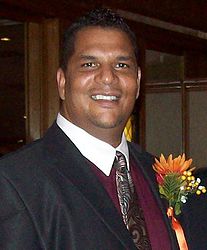Denny founded F I Community Housing in 1995. Today, it’s Ohio’s largest peer-operated recovery community. Denny’s past informs his present mission in fighting the opioid epidemic: by the age of 25, he was addicted to several drugs, including heroin, crack cocaine, and alcohol. After he went through a 21-day recovery program, Denny was awarded a 14-day stay in a sober house. He came under the wing of a mentor who created a safe space and gave him hope. “He was the world’s first recovery coach, to me,” Denny says. “He asked me one key question. What is it that you want?”
Denny tried to give his mentor the answers he felt he had been programmed for—that he wanted to get his life together, get a nice house, a good job, a nice car. But that wasn’t the real issue. Denny explains, “He looked me dead in the eyes and said, ‘No, what do you really want?’ That’s when I broke down and said, you know what, I want my wife and kids back. I want to have a relationship with my mom and my dad and my sisters and my brothers.”
Denny tells how this experience led him to create a peer-operated recovery community. “God, for those who believe in him, spoke to me directly and said, ‘This is what I want you doing for the rest of your life: helping other people find stable housing and supportive services, just like you have received.’ That’s been my lifelong mission since.”
Denny discusses the options for recovery housing that are currently available. “Families need to realize that recovery housing isn’t new. It’s been around since the 1800s… for the most part, it has to be centered around a peer, someone with that lived experience.”
Denny discusses the factors which families should look for in choosing recovery housing. “Is it peer driven? Is it peer oriented? Is it peer operated? Is it peer owned?… versus someone who has a lucrative property and thinks this is going to be a money-making opportunity. We don’t need any landlords. We don’t need people wanting to show up once a month, once a week, to collect program fees, rents, whatever you want to call it. We need people who are going to engage us and provide support outside a physical structure.”





Leave A Comment